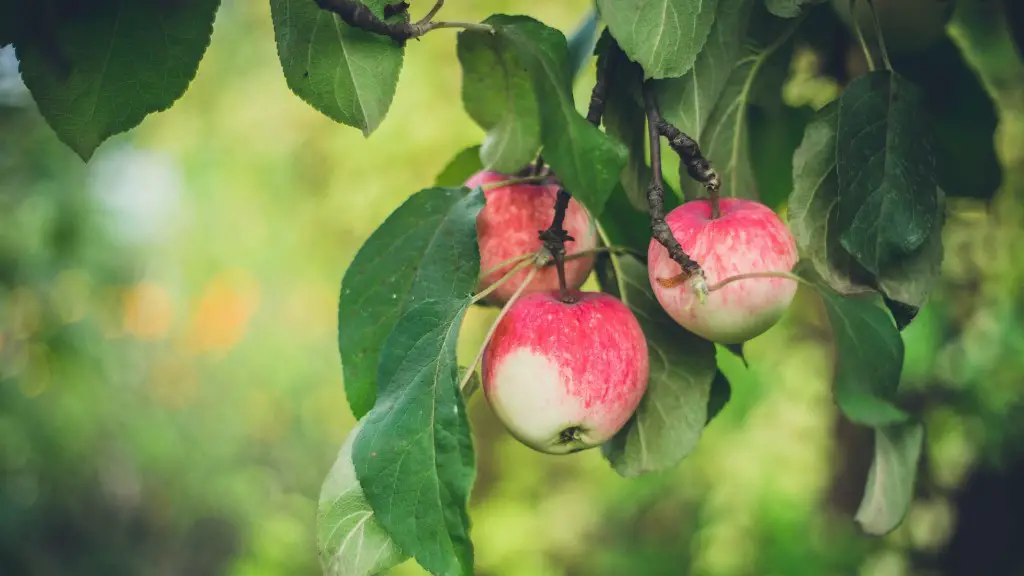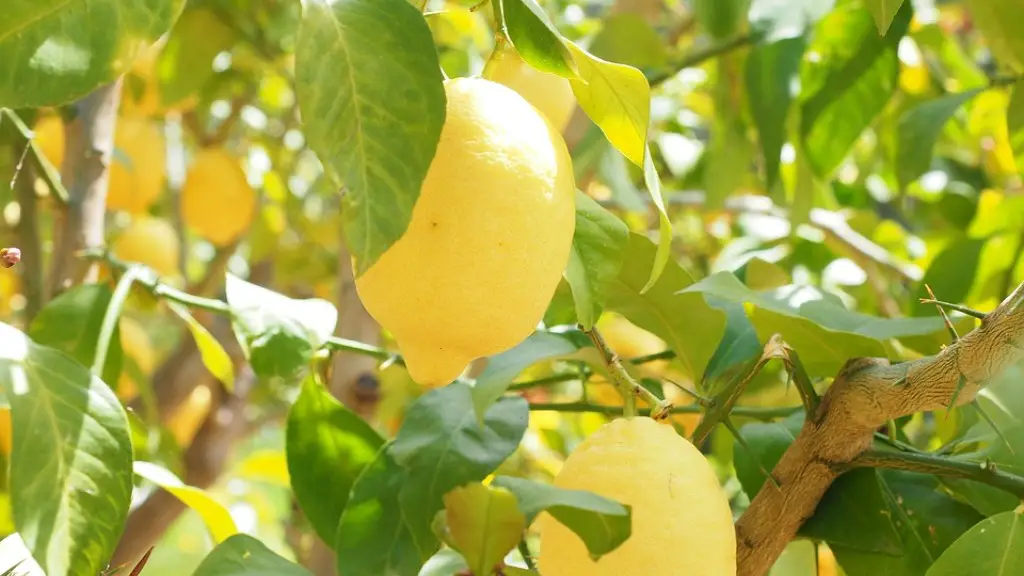It is a common belief that fruits ripen off the tree. But the question is, will an apple ripen off the tree? To answer this question, we must first understand the ripening process of an apple. Apples ripen due to the release of ethylene gas. This gas helps break down cell walls within the apple which causes the apple to become softer and more flavorful. With the aid of ethylene gas, the apple can be ripened off the tree, but there are certain conditions that must be met for this to be successful.
First, the temperature must be kept between 60-70 degrees Fahrenheit. This range will allow the ethylene to build in the atmosphere, but not too hot that it would cause the apple to overripen. Also, the atmosphere should remain humid in order to maintain the moistness of the skin and the integrity of the cell walls. Keeping the atmosphere moist prevents the apple from turning mealy.
Second, the apple must be mature when picked. The amount of ethylene the apple produces is its primary tool for ripening and if the apple is not mature enough, it may not ripen completely. Therefore, it is important to wait until the apple is fully mature on the tree. Once it has reached this stage, it can be harvested for off-the-tree ripening.
Finally, the ripening process needs to be monitored. The best way to monitor the apple’s ripening is by tracking the weight of the apple. Apples soften during their ripening process and this can be noticed through the weight of the apple. Also, the color, firmness, and aroma can all be used to determine if the apple is ripening.
In conclusion, an apple can ripen off the tree under controlled conditions. For the apple to ripen successfully, it must be mature when picked, kept in an appropriate temperature range, and monitored throughout the ripening process. If these conditions are met, the apple will ripen off the tree to perfection.
How To Pick An Apple For Off The Tree Ripening?
When picking an apple for off the tree ripening, it is important to ensure that it is fully mature and ready to be harvested. Apples will be hard and glossy when they are unripe and they will eventually turn red, yellow, or orange as they ripen. It is best to pick a fruit that has at least a hint of color. Also, when you pick the apple, make sure there are no bruises or blemishes. If the apple has a bruise, it will not ripen off the tree.
The size of the apple also matters, as larger apples need more time to ripen. If the apple is too small, it may not get enough time to develop the sweetness and flavor. Smaller apples are more prone to becoming mealy during the ripening process, so it is best to pick a larger apple.
Finally, the variety of apple is important. Certain varieties, like Red Delicious, can be tricky to ripen off the tree due to the amount of starch they contain. Granny Smith and Honeycrisp apples are recommended as they ripen relatively quickly and have a great flavor.
At What Temperature Should Apples Be Ripened?
Apples can be ripened off the tree, but it must be kept in the right temperature. The ideal range is between 60-70 degrees Fahrenheit, as this will allow for an increase in the amount of ethylene gas in the atmosphere but not too hot that would cause the apple to overripen.
When it comes to ripening, cooler temperatures are better, as this allows the apple to ripen gradually over a longer period of time as opposed to a sudden rise in temperature that can cause overripening. Also, temperatures above 75 degrees Fahrenheit are not recommended as this can cause the apple to become mealy.
Apples should also be kept in a place where there is plenty of humidity. This will help prevent the fruit from drying out and will ensure the integrity of the cell walls while the apple ripens.
Issues Caused By Overripe Apples
Apples that are overripe can become soft and mushy and can be prone to browning. This can prevent the apples from being eaten raw and can make them unappealing to look at. Overripe apples also have a loss in flavor and texture and may lose their juice when cut.
In addition, overripe apples can attract pests and mold. The mold can cause discoloration and the apples may have off-flavors. This can be a health risk, as the mold can contain mycotoxins, which can be harmful for human consumption.
It is important to monitor the ripening process of an apple to make sure it does not become overripe. If the apple is getting too soft, it should be removed so that it does not decompose. It can then be used for baking or other culinary uses.
Can Apples Be Frozen For Later Use?
Apples can be frozen for later use, but there are a few things to consider before freezing them. Apples should be cut into slices or pieces before freezing as this helps to prevent the texture of the fruit from becoming mushy during the freezing process. It is best to freeze the apples in a sealed container or bag and place it in the coldest area of the freezer. This will help to keep the apples in the best condition possible.
Once the apples are frozen, they should be removed from the freezer and used within 3-4 months. The best way to thaw the apples is to leave them in the refrigerator overnight or to place them in a bowl of cold water. When thawing, it is important to check the frozen apples to make sure they are still firm and not mushy. If they are too soft, they should not be used.
Apples can be a convenient way to store fruit for future use and they are a great addition to any meal or snack. As long as they are handled properly and kept in the right conditions, apples can be frozen for later use with great results.
Storage Tips For Apples
Apples can be stored for long periods of time and still maintain their flavor and texture if they are stored properly. The best way to store apples is in a cool, dark place, as this prevents them from getting too warm and ripening too quickly. Apples should also not be stored in contact with other fruits or vegetables, as this can cause the ripening process to be hastened.
It is also important to store the apples in a dry place, as moisture can cause the apples to mold and rot. The refrigerator is the best place to store apples, as it provides the optimal temperature, humidity, and light conditions. Apples can last up to one month when stored in the refrigerator.
It is also important to regularly check the apples while they are in storage. Any apples with bruises or blemishes should be removed as they will not store well and may cause other apples to rot. Apples should also be tossed if they are starting to turn soft or show signs of spoilage.
In summary, apples can be stored for long periods of time if they are stored properly. They should be kept in a cool, dark, dry place, and away from other fruits and vegetables. Also, regular inspection of the apples is essential to make sure that they are still in good condition and that any bruised or spoiled ones are removed.




